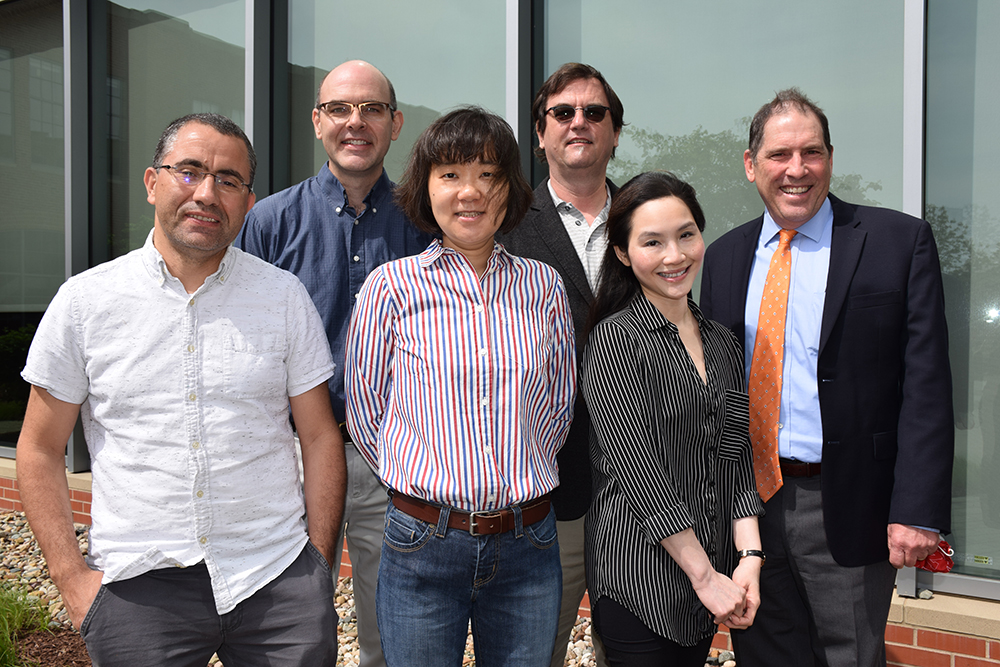Nebraska gains five-year, $20 million funding from NSF
EQUATE project will conduct quantum materials research and outreach
On May 24, a new research collaboration was announced for Nebraska. With National Science Foundation (NSF) funding starting June 1 for five years totaling $20 million, the Emergent Quantum Materials and Technologies (“EQUATE”) group will study quantum properties of materials—potentially advancing technology, medical applications, national security, and more.
The EQUATE project is funded though NSF’s Established Program to Stimulate Competitive Research (EPSCoR) and will involve more than 20 scientists—including physicists, chemists, and engineers—at six Nebraska colleges and universities: University of Nebraska-Lincoln (UNL), University of Nebraska at Omaha, University of Nebraska at Kearney, Creighton University, Nebraska Indian Community College, and Little Priest Tribal College.
EPSCoR is an NSF program for states that traditionally receive less research funding from federal programs. According to José Colom-Ustáriz, a program director with NSF EPSCoR: “This project (EQUATE) furthers Nebraska’s strategic priority to advance knowledge in quantum phenomena. It has the potential to benefit society through research outcomes, workforce development and STEM education and training, specifically in Native American and rural communities.”
As part of NSF’s Research Infrastructure Improvement (RII) resources, “Track-1” projects are funded to study important basic science topics via the recipient states’ higher education sites—both large and small colleges/universities—and extend that benefit to the state’s people. EQUATE’s proposal pursued alignment with one of NSF’s “10 Big Ideas,” Quantum Leap, described as: “Exploiting quantum mechanics to observe, manipulate, and control the behavior of particles and energy at atomic and subatomic scales, resulting in next-generation quantum-enabled science and technology for sensing, information processing, communicating, and computing.”
UNL’s Christian Binek, Charles Bessey Professor of physics and EQUATE’s scientific director, said the project’s goal is to stimulate scientific discovery in how quantum materials and systems are designed and implemented, which has the potential to revolutionize technologies used in communication and information processing. He added the Nebraska Center for Materials and Nanoscience and the Materials Research Science and Engineering Center, both based at UNL, created a foundation for success and led to formation of the Nebraska Nanoscale Facility, all fundamental to EQUATE’s work.
Matt Andrews, a UNL professor who is Nebraska EPSCoR’s director and EQUATE’s principal investigator, said the collaboration also includes a focus on preparing the next generation of scientists and engineers via structured outreach activities. Andrews added that Nebraska first qualified for the NSF EPSCoR program in the early 1990s and since then has earned several NSF RII Track-1 projects, most recently its Center for Root and Rhizobiome Innovation (funded 2016-2021). Nebraska EPSCoR also leads the ongoing Young Nebraska Scientists program which offers science, technology, engineering, and math (STEM) opportunities for youth throughout the state.
According to a UNL news release, EQUATE aims “to grow the state’s economic competitiveness through a well-trained workforce; establish education and outreach programs to increase understanding of quantum science and technology, particularly among secondary and post-secondary students; invest in new, cutting-edge equipment; make strategic faculty hires to increase research capacity and expertise; engage with local industry partners; and secure major research funding.”
“Thanks to our faculty, the University of Nebraska has built a proven record of success in quantum science. This new award, made possible by the collaborative power of our campuses and partners, will only grow the impact of our work,” said University of Nebraska System President Ted Carter. “EQUATE will significantly expand our state’s research and teaching capacity, make cutting-edge science accessible to more Nebraskans, and create economic growth.”
EQUATE is supported by the National Science Foundation EPSCoR RII Track-1 program via award number OIA-2044049. Any opinions, findings, and conclusions or recommendations expressed in this material are those of the author(s) and do not necessarily reflect the views of the National Science Foundation.

PHOTO---EQUATE leaders (left to right) are: Abdelghani Laraoui, University of Nebraska-Lincoln (UNL) assistant professor of mechanical and materials engineering; Jonathan Wrubel associate professor of physics at Creighton University; Xia Hong, UNL associate professor of physics and astronomy; Christian Binek, UNL Charles Bessey Professor of physics and science director for EQUATE; Rebecca Lai, associate professor of chemistry and associate director for EQUATE; and Matt Andrews, Nebraska EPSCoR director and EQUATE principal investigator.